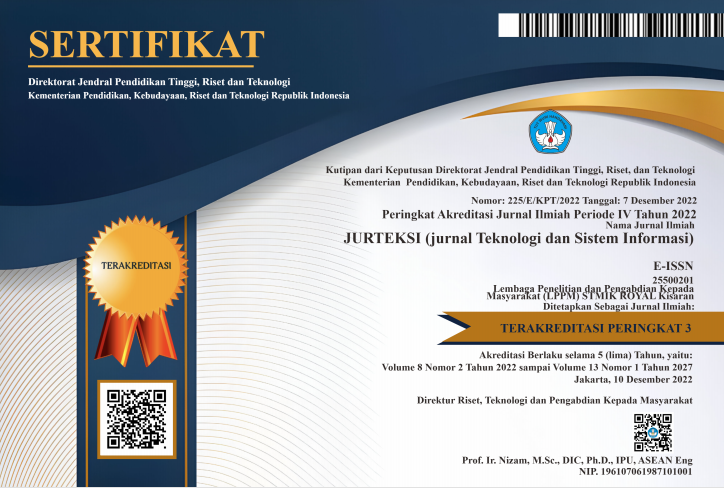COUNSELING MODEL BASED ON BACKWARD CHAINING OF STUDENT BEHAVIOR AT SMK 10 MUHAMMADIYAH KISARAN
Abstract
Student development includes conduct as a key component. Student behavior becomes crucial in deciding how successful students will be in different spheres of life. The variety of student behavior can hinder the learning process and personal development of students. Through the development of an expert system-based counseling model based on backward chaining, this study seeks to discover trends in student behavior. The research process starts with problem analysis, goal setting, literature study, data collection, system design and implementation, and results analysis. It then moves on to counseling model development and implementation in the school setting. To determine the reasons for the unruly behavior of the kids, data were analyzed using a backward chaining methodology. UML Usecase diagrams are used in system design to define the roles of actors and users. The established counseling model, which consists of 14 behaviors, 67 phenomena/symptoms, and 14 rules, focuses on goals and methods to modify student behavior. Three students underwent system testing based on previously achieved goals from therapy. The findings revealed "Smoking," "Emotional Problems," and "Fighting" among the student behaviors. When the Backward Chaining-based counseling model is used, it is simpler for homeroom teachers to gather information about students' conduct from them and to offer remedies based on the transfer of professional knowledge without having to wait for the counselor guidance procedure
References
D. Pristiwanti, B. Badariah, S. Hidayat, and R. S. Dewi, “Pengertian Pendidikan,†J. Pendidik. Dan Konseling, vol. 4, no. 6, pp. 1707–1715, 2022.
S. Fiolanisa, D. Lestari, D. A. Prasasti, and G. Santoso, “Jurnal Pendidikan Transformatif ( Jupetra ) Hubungan Pendidikan Karakter dengan Pola Perilaku Siswa di Lingkungan Sekitar Jurnal Pendidikan Transformatif ( Jupetra ),†vol. 02, no. 02, pp. 380–390, 2023.
B. A. Habsy, “Filosofi Keilmuan Bimbingan Dan Konseling,†vol. 2, pp. 1–7, 2017, [Online]. Available: https://journal.unesa.ac.id/index.php/jp/article/viewFile/584/724
A. Maulida, A. Rahmatulloh, I. Ahussalim, R. A. J. Mulia, and P. Rosyani, “Analisis Metode Forward Chaining pada Sistem Pakar : Systematic Literature Review,†J. Manajemen, Ekon. Kewirausahaan,kesehatan,Pendidikan dan Inform., vol. 1, no. 04, pp. 144–151, 2023.
I. Artikel and A. Info, “Buah Salak Berbasis Web Menggunakan Algoritma,†vol. 2, no. 1, pp. 15–19, 2023.
J. Jurnal et al., “Asisten Diagnostik Cerdas Untuk Kecanduan Internet Berbasis Sistem Pakar Yang Menggunakan Runut Mundur,†vol. 3, no. 2, pp. 322–332, 2023.
M. Faisal, D. Sidik, and B. Apriyanto, “Sistem Pakar Untuk Screening Awal Pada Gangguan PTSD ( Post Traumatic Stress Disorder ) Menggunakan Metode Forward Chaining Berbasis Website,†vol. 1, no. 3, pp. 595–609, 2023.
S. D. Putra, D. M. Putri, and S. Defit, “Sistem Pakar Metode Backward Chaining untuk Optimalisasi Pelayanan Pemberian Informasi Obat,†vol. 01, pp. 1–7, 2023.
O. F. Alviansyah and M. N. Ikhsanto, “TANAMAN PORANG MENGGUNAKAN,†vol. 23, no. 01, pp. 1–11, 2023.
M. Khaibar and P. Adithia, “Metode Backward Chaining Penerimaan Beasiswa Dipa Universitas Islam Negeri Sumatera Utara,†vol. 3, pp. 14266–14275, 2023.
Universitas Universal, “Data Kemahasiswaan Universitas Universal,†pp. 14–21, 2021.













